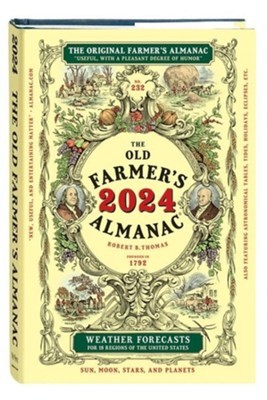Are you fed up with the recent record-setting heat in much of the country? Well, I have some good news (or maybe it is bad news). The 2024 Farmers’ Almanac's message is clear: prepare for cold in the northeastern United States.
As a child growing up in Maine (in the extreme northeastern corner of the country), my family always purchased the new Farmer's Almanac as soon as it appeared on store shelves every year. All family members then pored over it's winter predictions and we usually believed them to be true. (Now that I am an adult, I'm not so sure about the accuracy of those predictions.)
 The 2024 Farmers' Almanac is now appearing on store shelves so it's time to pore over the wintertime predictions.
The 2024 Farmers' Almanac is now appearing on store shelves so it's time to pore over the wintertime predictions.
And their message to New Englanders is clear: prepare for a cold one.
According to the 2024 Farmers’ Almanac, “The BRRR is back!” after an unseasonably warm winter this year, the 200-year-old Maine-based periodical wrote in its winter 2024 extended forecast, published Tuesday.
The almanac predicted blizzard conditions in northern New England as early as December 2023.
“For those of you living along the I-95 corridor from Washington to Boston who saw a lack of wintry precipitation last winter,” the almanac announced, “you should experience quite the opposite, with lots of rain/sleet and snowstorms to contend with.”
The almanac also said the second week of February will bring “an East Coast storm affecting the Northeast and New England states,” marked by “snowfall, cold rain and then frigid temperatures.”
There will be another East Coast storm in early March, the periodical reported, followed by one last snowfall for New England’s higher elevations in late April.
Farmers’ Almanac reports using a “mathematical and astronomical formula” — tweaked only slightly since its development in 1818 by the periodical’s first editor — to make its signature long-range weather predictions.
But the formula itself is a bit of a mystery. We know the almanac considers indicators like sunspot activity, the planets’ positions and the moon’s effect on tides to develop its forecasts. However, “the only person who knows the exact formula is the Farmers’ Almanac weather prognosticator who goes by the pseudonym of Caleb Weatherbee,” according to the almanac’s website.
“To protect this proprietary formula, the editors of the Farmers’ Almanac prefer to keep both Caleb’s true identity and the formula a closely guarded brand secret,” the site reads.
I'm not too worried about this winter's forecast. While I was born and raised in northern Maine, I now live in Florida. I'm not too worried about “snowfall, cold rain, and then frigid temperatures.”
How about you?
 Latest News Articles
Latest News Articles Do you have an RSS newsreader? You may prefer to use this newsletter's RSS feed at:
Do you have an RSS newsreader? You may prefer to use this newsletter's RSS feed at: